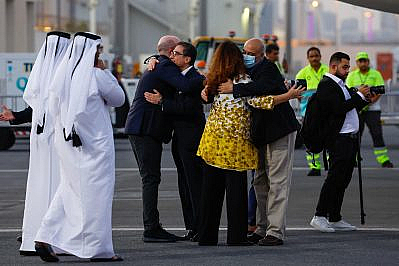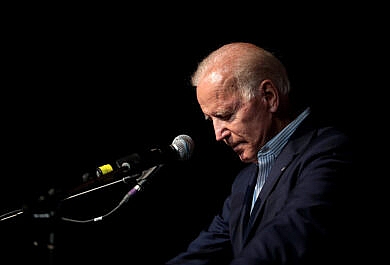The Biden administration unfroze nearly $6 billion in Iranian assets as part of a prisoner swap for five American hostages who had been detained in Iran for several years.
Summary
The Biden administration unfroze nearly $6 billion in Iranian assets as part of a prisoner swap for five American hostages who had been detained in Iran for several years.
- The five US citizens landed in Doha, Qatar on Monday and were set to return to the US on Monday night. Five Iranians held in the US were released in exchange, along with the transfer of nearly $6 billion that had been held in South Korea.
- The five freed Americans included Siamak Namazi, an Iranian American businessman who had been detained since 2015.
- Others freed included Emad Sharghi, a tech businessman, had been forced to remain in Iran since 2018 and imprisoned since 2021. Morad Tahbaz was first detained in 2018 and sentenced to a decade in prison in 2019 for “spying.” The final two prisoners were not identified.
- Secretary of State Antony Blinken claimed the $6 billion could only be used for humanitarian purposes and was thus of “limited benefit,” though how the administration could possibly verify this – or get around the inherent fungibility of money – was not explained.
- Iranian officials have claimed they will spend the money as they’d like. US officials insisted that the funds will not go directly to Iran and will only be allowed for purchases of food, medicine, and agriculture.
- The five Iranians released by the US included Kaveh Lotfolah Afrasiabi, charged with failing to register as a foreign agent; Mehrdad Ansari, sentenced to 63 months for obtaining nuclear weapons equipment; Amin Hasanzadeh, charged with stealing plans from his employer to send to the Islamic Republic; Reza Sarhangpour Kafrani, chanrged with illegally exporting lab equipment; and Kambiz Attar Kashani, sentenced to 2.5 years in prison for buying “top-tier US electronic equipment” through front companies.
- One Senate Republican condemned President Joe Biden for paying “a ransom to the world’s worst state sponsor of terrorism.” Rep. Michael McCaul, the GOP Chairman of the House Foreign Affairs Committee, said in a statement, “”I remain deeply concerned that the administration’s decision to waive sanctions to facilitate the transfer of $6 billion in funds for Iran, the world’s top state sponsor of terrorism, creates a direct incentive for America’s adversaries to conduct future hostage-taking.”
- Senior Biden administration officials told Reuters that they planned to maintain US pressure on the Islamic Republic by imposing new sanctions on those responsible for detaining US citizens including former President Mahmoud Ahmadinejad.
- GOP Sen. Mitt Romney blasted the deal as a “horrible idea” that would only lead to “more kidnappings.” “That’s why you don’t negotiate with terrorists,” Romney continued. “That’s why you don’t negotiate with kidnappers.”
![]()
- A CNN analysis concluded that Biden took “a political hit” with the hostage deal. Stephen Collinson wrote the deal “is creating the kind of terrible optics and an opening for his domestic foes that a politically weakened president can ill afford.”
- NBC News covered Biden’s remarks about the swap. “As we celebrate the return of these Americans,” the president said, “we also remember those who did not return. I call on the Iranian regime to give a full account of what happened to Bob Levinson. The Levinson family deserves answers.” NBC News noted, “Levinson was a former DEA and FBI agent taken prisoner by Iran in 2007 and presumed to have died in captivity prior to March 25, 2020.”
- The New York Times covered State Department spokesman Matthew Miller’s attempts to defend the deal’s supposed limitations on how Iran spends the $6 billion in light of Iranian President Ebrahim Raisi’s insistence that he would spend it “wherever we need it.” Miller tried to imply to reporters that his remarks were merely for “domestic political purposes.”
![]()
- The New York Post covered former Secretary of State Mike Pompeo’s condemnation of the deal. ““It’s a ransom payment of $6 billion,” Pompeo told Fox News. “That’s about $1 billion per American.” He elaborated, “The incentive system is now put in place — not just for the Iranians, but for the North Koreans, for every bad actor — that says, ‘Take an American, you’ll get a billion dollars. It is terrible policy.”
- The Editors of National Review rebuked “Biden’s Iran catastrophe.” They wrote, “Once again, the administration is jacking up the price that this country’s enemies can demand for the return of Americans they seize.” They noted “the Trump administration was able to secure the release of a hostage held by Iran without providing a cash infusion to the regime. This White House is just an easy mark.”
- The Wall Street Journal observed, “The question remains whether Iran’s release of the American prisoners will spur a broader accommodation between Tehran and the West on the nuclear front and in the region. So far, the picture is mixed. In recent months, Iran has slowed the rate at which it has amassed near-weapons-grade uranium. That step has encouraged hope that negotiations over Iran’s nuclear program might resume after a hiatus of more than a year.”
© Dominic Moore, 2023






